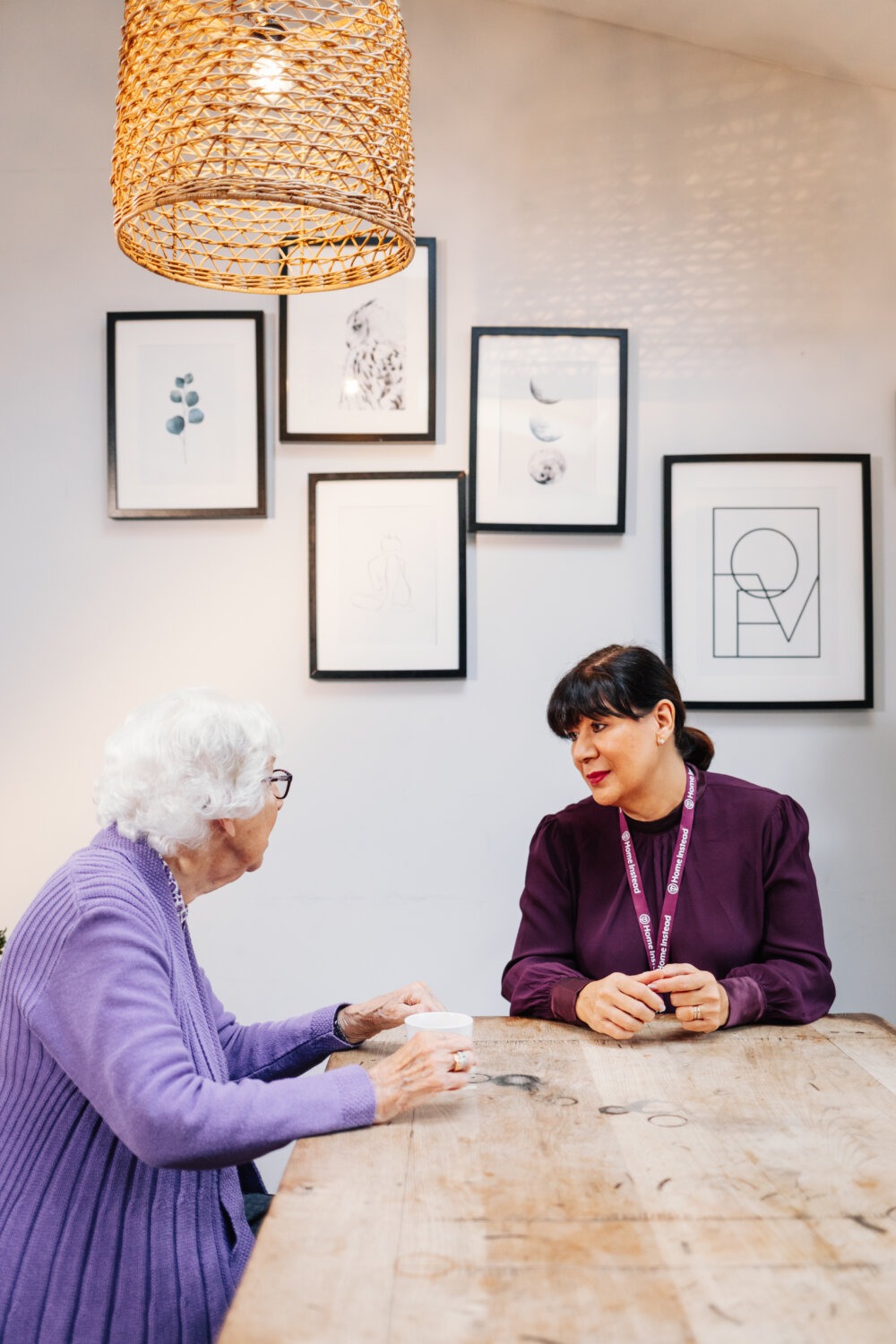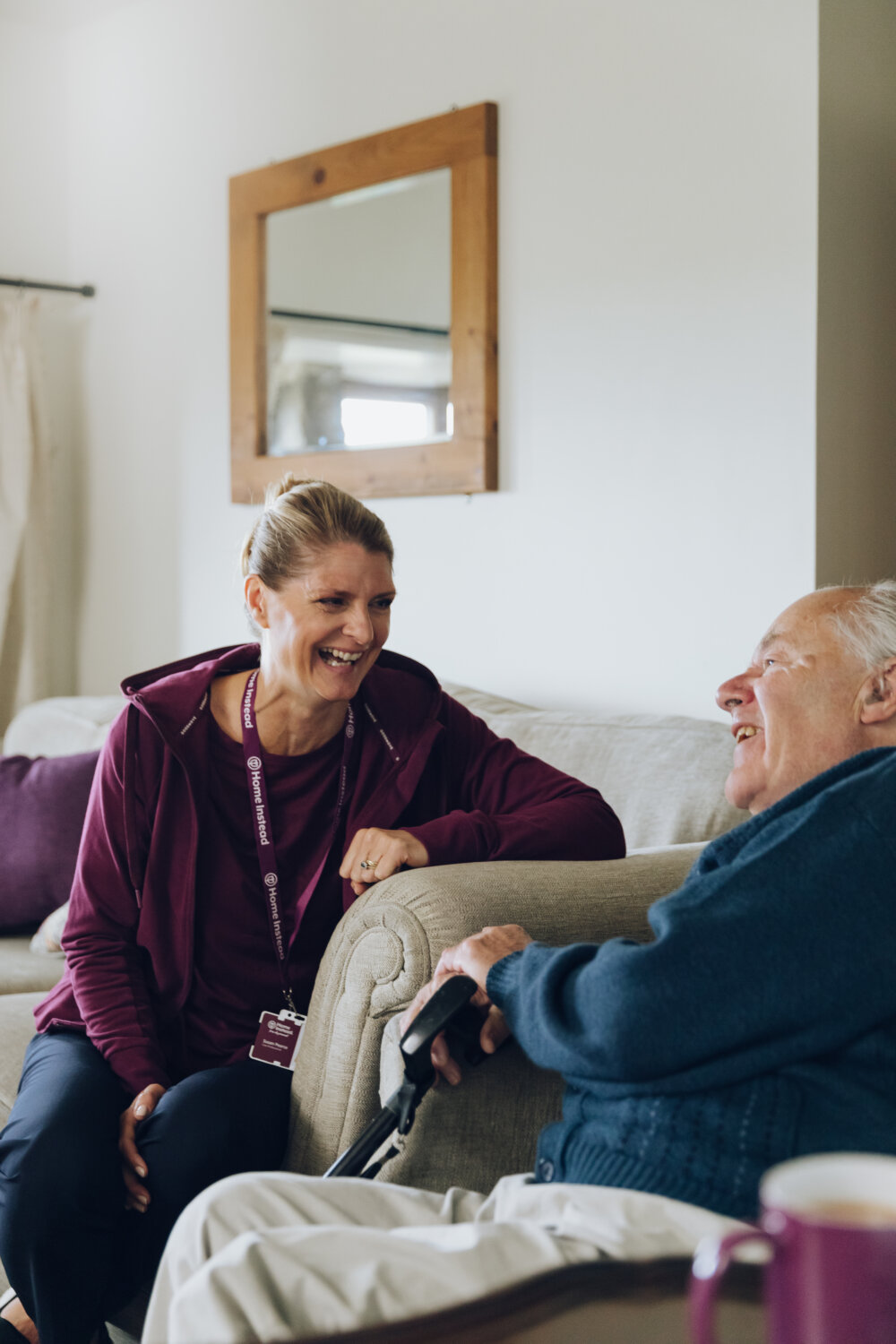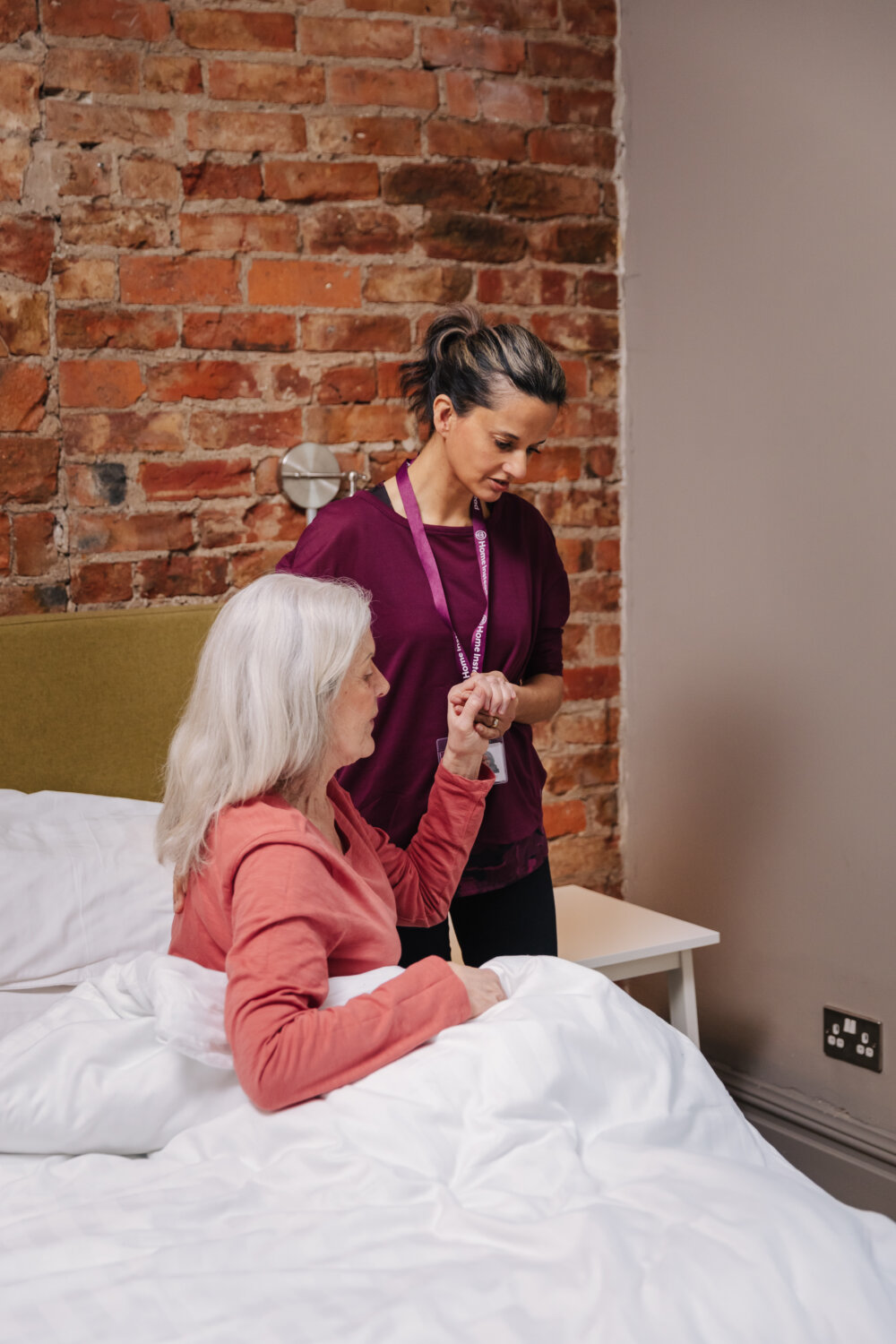The benefits of home care vs a care home
As we age, we all begin to require more help with everyday tasks, personal care, and managing our health, but the reality of ageing shouldn’t feel scary or overwhelming. When the time comes and you need a little more help, your choice of where to live should always be in your hands.

Differences between home care and care in a care home.
Many older people worry about moving into a care home in future, but at Home Instead, our aim is to help people age positively and in place – we bring expert care to their home. There are many benefits to choosing home care instead of a care home, but this is a big life choice, and we understand you will want to make the best decision for yourself or your loved one. We’ve helped thousands of families, so whatever questions you have about home care vs a care home, Home Instead can help.
What is home care?
Home care, or domiciliary care, means care received in someone’s own home instead of in a hospital, clinic, assisted living facility, care home or nursing home. You or your loved one may need a helping hand with daily activities like cooking, cleaning or remembering to take medications, or medical support like arthritis and mobility care, catheter or stoma management, or something else. Whatever your needs, if you are not yet ready to move to a care home, it is highly likely the care you require can be provided in the comfort of your own home by a trained professional. You can read more in our guide: What Is Home Or Domiciliary Care?

What are the advantages of home care?
Home care has many advantages that make it a perfect choice for individuals with disabilities or anyone recovering from an illness or surgery, however it is also a great option for seniors who require additional care as they age. Not every elderly person will benefit from home care, but here are some of the advantages:
Positive wellbeing
Home care can have a positive impact on wellbeing and happiness. One study led by researchers from the Nuffield Department of Population Health at the University of Oxford found patients who received home care experienced the same positive health outcomes six months later as those who were admitted to hospital, but saw higher levels of patient satisfaction. The World Health Organization recommends elderly individuals are cared for in their own homes for as long as possible to maintain a strong sense of wellbeing, ideally by a home help organisation in order to reduce pressure on families.
Familiar, comfortable surroundings
This may be one of the most important benefits of home care. Moving house is a stressful experience for anyone, so moving out of the place you call home in your twilight years can be a major emotional upheaval. Keeping elderly people in their own home surrounded by their own possessions and memories can have a positive impact, and there is no reason to leave these things behind in order to receive adequate care – this is possible at home. Individuals living with dementia may find home care especially helpful, as staying in familiar surroundings means they are less likely to feel confused, anxious or lost. A 2013 study found those living with dementia at home experienced higher activity levels, quality of life, and felt more socially connected than those living in a care home. Another study found that after one month of home care, participants were less likely to develop acute confusion than those living in a care home.
Improved independence
Home care can help maintain a sense of independence, which is important for an individual to feel they are at the centre of their own care journey. Research suggests interventions to maintain independent living have the potential to improve health perception and self-efficacy in seniors, so remaining at home throughout the care journey with an individualised support plan can help you or your loved one to feel content and confident. Staying at home also means the individual can manage things like temperature and noise levels in the home, when they feel like socialising, when they want to eat and sleep, and more. All of these options contribute to a sense of independence.
Family visits
Home care often makes it easier for family and friends to visit regularly and stay involved in the care process. While many care homes maintain visiting hours and set meal times, staying at home means your family can visit anytime, eat with you, watch TV with you, stay as long as they like, and enjoy spending uninterrupted time together. Financial peace of mind: When someone moves into a care home, they may feel the need to sell their own home in order to pay for this expensive form of care. This can be incredibly stressful, and alongside the financial worries of keeping up with care home payments, you must also condense your possessions to fit into one room, manage the upheaval of house viewings with estate agents, and the big move itself. Home care can help avoid these stresses and financial worries, and can often be more affordable than moving into a care home.
Flexibility
With home care, you won’t pay for care you do not yet require. Home care enables you to choose the areas you currently need help in, and how often. As you begin to require more help, you can add additional services as needed so you always feel supported and in control of your care journey. There are options to suit all – from frequent pop-ins for companionship or home help, to live-in care or even round the clock 24 hour care at home.
Community
For many people, moving away from their community support system can be challenging, but with home care an elderly individual can remain an active member of their community, see friends, attend local events, and enjoy the place they call home.
Pets
Pets can be a huge source of comfort for elderly people. Many of us see them as members of the family, so asking someone to part ways with a beloved pet in order to move to a care home can be a traumatic experience. Home care enables anyone to continue living with their much-loved companions, and avoids pets feeling abandoned by their owners.
Strong carer bond
The professional carers in care homes are just as qualified, friendly and helpful as home care professionals, however, care at home can sometimes establish a stronger bond with carers. With a highly personalised service in your own home, your carer will see where you live, ask about the photos on your mantelpiece, and get to know your family, interests and hobbies.
Palliative options
People with terminal illness may wish to stay at home surrounded by the people they love and their own belongings – according to research, 71% of people would prefer at home palliative care over a hospice. During this stressful time it can be a comfort to spend the final months of life with family members and in familiar surroundings, which is why end of life care at home is also a welcome alternative for many.
What are the disadvantages of home care?
Everyone requires bespoke care, and home care won’t suit everyone. Some disadvantages of this type of care include:
- Home alterations: As mobility decreases, changes may be required to keep the home safe. Luckily, most homes are easily adapted if alterations are needed, and our expert team can help and advise you on this.
- Home administration: Staying at home means admin like paying bills, dealing with home repairs and so on, which can be difficult if you have a health condition.
- Palliative care needs: these care requirements can be difficult if family members are helping with caring responsibilities. As things progress, round-the-clock care will be required and a hospice may actually turn out to be a preferable option to put everyone’s mind at ease.

What are the advantages of a care home?
At Home Instead, we wholeheartedly believe home care has more benefits than a care home, however we acknowledge there may also be advantages to care homes. Here are some of their benefits:
- A sense of safety: There are usually a lot of people around, so if an individual has concerns about being alone when ill, then a care home could provide the busy atmosphere needed to feel safe at all times. Alternatively, emergency pull cords and buttons can be installed at home to alert carers when needed. Care homes also have equipment and infrastructure to help those with mobility issues. These can also be installed at home, and studies have shown home assessment and tailored interventions can reduce recurrent falls of elderly individuals by as much as 38%.
- Social life: Care homes often have many opportunities for social contact, which can keep feelings of loneliness at bay. They also operate a schedule of entertaining activities to keep seniors engaged, such as crafting, music, games and more, and will sometimes organise fun outings.
- Standards: Care homes have certain standards they must meet, and are regulated and assessed according to the Care Quality Commission, so you can be assured you or your loved one is in good hands.
- Easy living: Living in a care home means all administrative responsibilities are sorted, such as paying utility bills, organising health appointments, and more. You or your loved one will no longer need to worry about cooking or cleaning, as all of this will be taken care of, making daily life more manageable and enjoyable.
What are the disadvantages of a care home?
As above, care homes also have their disadvantages, for example:
- Expense: Care homes can be the more expensive option, and some people need to sell their home in order to finance them. According to Age UK, it costs on average £800 to £1,078 per week for a place in a care or nursing home, however this depends on where you live in the country and other factors.
- Poorer health: There is evidence to suggest care home residents may see a decline in their health after moving. The Office for National Statistics states that life expectancy for care home residents between 2021 and 2022 ranged from 2.9 to 7 years for female residents, and 2.2 to 6.3 years for male residents; a significantly lower life expectancy when compared with non-care home residents.
- Strict rules: Care homes often impose rules for the good of all residents, but these may not suit the individual. These could include specific meal times (with limited food choices), family visiting hours, separate rooms for married couples, no pets, and more.
While care homes can be useful, for all of the above reasons many people choose to avoid moving into a care home for as long as possible. Instead, home care can be a great option that can maintain health, independence, wellbeing and a sense of control over your life and care.
What types of home care does Home Instead provide?
At Home Instead, we understand there’s no place like home, so our home care offering aims to help elderly individuals retain independence and stay in familiar surroundings. We offer a number of bespoke services which can be tailored to your needs, including companionship, home help and housekeeping, personal care and grooming, night care, respite care, Alzheimer’s and dementia care, cancer support, neurological care, postoperative and recovery care, vital signs monitoring, diabetes monitoring, and more. Our Care Professionals are highly trained to deliver the individualised services you need, so no matter what type of home care you require, we can provide a tailored service that suits you or your loved one – reach out to the team at Home Instead to learn more.We’re an award-winning home care provider and part of a worldwide organisation devoted to providing the highest-quality relationship-led care for older people in their own homes. Arranging care for yourself or your loved one shouldn’t be stressful, so whatever questions you would like answered, feel free to reach out to the Home Instead team to discuss your needs.


Diane WIlliams , Head of Quality & Standards
Before joining Home Instead, I built a comprehensive career in the social care sector, beginning in 1991 as a frontline care worker and advancing to senior leadership roles across both private and voluntary sector businesses.
Throughout my career, I have supported diverse care groups in a variety of settings, including community, residential, nursing, and secure environments. My experience spans working with older adults, including those living with dementia; individuals with physical disabilities and complex, long-term health needs; people with learning disabilities, including autism; individuals with enduring mental health challenges; individuals with current or past substance use and those with forensic backgrounds.
In 2002, I qualified as a social worker and have since maintained my professional registration with Social Work England.